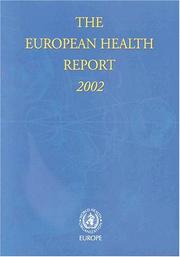| Listing 1 - 10 of 19 | << page >> |
Sort by
|
Dissertation
Year: 2002 Publisher: Bruxelles: UCL,
Abstract | Keywords | Export | Availability | Bookmark
 Loading...
Loading...Choose an application
- Reference Manager
- EndNote
- RefWorks (Direct export to RefWorks)
This dissertation aims at analyzing the relationship between socio-economic status (SES) and mental health and care. It attempts to understand how different socio-economic groups present unequal risk of mental disorders and to what extent different socio-economic groups use unequal quantity, type and quality of mental care. Since its earlier beginnings, psychiatric epidemiology has evidenced the association between socio-economic status and mental disorder. However, the numerous prevalence studies addressing depression have yielded inconsistent results. This calls for a thorough investigation of the sources of such heterogeneity. This dissertation attempts to achieve the following objectives: · To unfold methodological and contextual covariates influencing the SES/mental health relationship. · To assess the longitudinal influences of material deprivation on depression. · To assess the extent to which outpatient and inpatient mental care are fairly used. The methodological influences of socio-economic inequalities in mental health were tackled through a meta-analysis of previously published works. We built a database of previous published studies addressing the socio-economic factors of depression prevalence, incidence and persistence in adults population studies and being published in English, French, German and Spanish after 1979. The lower socio-economic group has 80% more prevalence of depression. Inequalities are more acute for persistent depression than for new episode. The results indicated that inequalities are much more pronounced when mental health is looked at from a subjective point of view or in terms of resulting disability. Social inequalities in mental health are also influenced by geographic context. Europe has a gradient 30% less pronounced than North-America. As the period of reference decreased, the gradient rose, suggesting that duration might be an explanatory factor. Geographical analysis of socio-economic inequalities in mortality is carried out with the death certificates of the Belgian National Institute of Statistics (NIS), covering all causes mortality and 11 specific mortality causes, from 1985 to 1993. Spatial concentration was computed through a Moran'I. We compare a simultaneous autoregressive model with a weighted-least-square model. Findings show that spatial concentration is pervasive, that suicide and mortality by liver cirrhosis are among the most correlated causes of death. Getting rid of spatial autocorrelation leads to significant change in the relationship between deprivation and mortality, suggesting the influence of contextual effects on socio-economic inequalities. The difficulty to move from correlation to causation between SES and depression owes partly to the difficulty of disentangling the direct effect of socio-economic status from other and numerous- confounding factors such as family history, genetic endowment, cognitive abilities, early schooling experience, which, for most of them are rather stable overtime. The longitudinal analysis attempts to estimate the impact of time-varying socio-economic covariates on depression. The results show that material deprivation (and change of) does not affect the level or the risk of depression while social network does slightly. We found much stronger gradient with time invariant socio-economic factors such as educational level. Inequity in outpatient mental care was assessed with the data of the first Belgian Health Interview Survey (HIS), a cross-sectional household-health interview survey carried out in Belgium in 1997. The Minimum Psychiatric Summary, a case register of all psychiatric admissions in Belgium (1997-98), allowed us to carry out the study of inpatient inequalities of mental care. In terms of mental health services uses, inequalities arise in the setting were care is delivered: less well-off use more primary care and less specialised care, are more likely to be admitted in a non-teaching, psychiatric hospitals with long length of stay. The lower the socio-economic groups with mood disorders are less likely to receive the expected treatment such as antidepressant and psychotherapies. Finally, the outcomes of the hospitalisation, in terms of overall functioning and in terms of psychological symptoms are less favourable for the individuals of lower socio-economic status. Part of such unequal outcome is related to unequal treatment. We concluded that inequalities in health should be addressed in their geographical context, that early and stable socio-economic factors are more important than time-varying factors. Horizontal socio-economic inequities arise in the type of care used as well as in the appropriateness of care. However, for a given equal treatment and use, outcome inequalities remain so that it seems relevant to consider socio-economic status as a general vertical equity principle.

ISBN: 2294010744 9782294010743 Year: 2002 Publisher: Paris: Masson,
Abstract | Keywords | Export | Availability | Bookmark
 Loading...
Loading...Choose an application
- Reference Manager
- EndNote
- RefWorks (Direct export to RefWorks)
Child Development --- Risk Factors --- Socioeconomic Factors --- Mental Disorders Diagnosed in Childhood

ISBN: 0683180517 047029213X 9786611317782 1281317780 0470292105 9780683180510 Year: 2002 Publisher: Philadelphia Lippincott
Abstract | Keywords | Export | Availability | Bookmark
 Loading...
Loading...Choose an application
- Reference Manager
- EndNote
- RefWorks (Direct export to RefWorks)
International Cooperation. --- Socioeconomic Factors. --- Veterinary Medicine --- Veterinary medicine. --- trends. --- Veterinary medicine --- #SBIB:39A9 --- Farriery --- Large animal medicine --- Large animal veterinary medicine --- Livestock medicine --- Veterinary science --- Medicine --- Animal health --- Animals --- Domestic animals --- Livestock --- Medische antropologie / gezondheid / handicaps --- Diseases --- Losses
Book
ISSN: 02508575 ISBN: 9289023651 9789289023658 Year: 2002 Volume: 97 Publisher: Genève Organisation mondiale de la Santé
Abstract | Keywords | Export | Availability | Bookmark
 Loading...
Loading...Choose an application
- Reference Manager
- EndNote
- RefWorks (Direct export to RefWorks)
Environmental health --- Environnement--Hygiène --- Health ecology --- Health--Environmental aspects --- Hygiène de l'environnement --- Hygiëne [Milieu] --- Indicateurs sanitaires --- Indicators (Health) --- Milieuhygiëne --- Sanitaire indicatoren --- Sanitary indicators --- Quality Indicators, Health Care --- Socioeconomic Factors --- Life Style --- Environmental Health --- Delivery of Health Care --- Health Policy --- Health Care Reform --- Gezondheidsindicatoren --- Gezondheidsbeleid --- Indicateurs de santé --- Politique de la santé --- Health --- Hygienic aspects --- Europe --- Health aspects
Book
Year: 2002 Publisher: Washington ; London : American Psychological Association,
Abstract | Keywords | Export | Availability | Bookmark
 Loading...
Loading...Choose an application
- Reference Manager
- EndNote
- RefWorks (Direct export to RefWorks)
People with disabilities --- Developmentally disabled --- Aptitude Tests. --- Employment. --- Psychological Tests. --- Disabled Persons. --- Educational Measurement. --- Education. --- Behavioral Disciplines and Activities. --- Persons. --- Socioeconomic Factors.. --- Anthropology, Education, Sociology and Social Phenomena. --- Psychiatry and Psychology. --- Named Groups. --- Population Characteristics --- Health Care.. --- Occupational Therapy & Rehabilitation --- Health & Biological Sciences --- Functional assessment.
Book

ISBN: 1598751352 Year: 2002 Publisher: Santa Monica : RAND Corporation,
Abstract | Keywords | Export | Availability | Bookmark
 Loading...
Loading...Choose an application
- Reference Manager
- EndNote
- RefWorks (Direct export to RefWorks)
This study examines the extent to which uncompensated care is provided by hopitals in Miami-Dade County, USA, other than Jackson Memorial Hospital (JMH), and whether the greater access to surtax-funded care at JMH might cause patients to pass up facilities nearer to the homes.
Health services accessibility. --- Hospital care. --- Hospitals. --- Medically uninsured persons. --- Medically uninsured persons --- Hospitals --- Health services accessibility --- Hospital care --- Economics, Hospital --- Medical Indigency --- Uncompensated Care --- Medically Uninsured --- Health Services Accessibility --- Delivery of Health Care --- Economics --- Socioeconomic Factors --- Persons --- Health Care Economics and Organizations --- Health Care Quality, Access, and Evaluation --- Patient Care Management --- Population Characteristics --- Health Services Administration --- Health Care --- Medical care --- Finance.
Book
Year: 2002 Publisher: [Place of publication not identified] American Psychological Association
Abstract | Keywords | Export | Availability | Bookmark
 Loading...
Loading...Choose an application
- Reference Manager
- EndNote
- RefWorks (Direct export to RefWorks)
Stress, Psychological --- Sex Factors --- Risk Assessment --- Employment --- Behavioral Symptoms --- Epidemiologic Factors --- Epidemiologic Measurements --- Risk --- Risk Management --- Psychophysiology --- Socioeconomic Factors --- Population Characteristics --- Behavior --- Probability --- Public Health --- Psychological Phenomena and Processes --- Organization and Administration --- Quality of Health Care --- Statistics as Topic --- Behavior and Behavior Mechanisms --- Health Care Quality, Access, and Evaluation --- Health Services Administration --- Environment and Public Health --- Health Care --- Psychiatry and Psychology --- Epidemiologic Methods --- Health Care Evaluation Mechanisms --- Investigative Techniques --- Analytical, Diagnostic and Therapeutic Techniques and Equipment --- Industrial Medicine --- Medicine --- Health & Biological Sciences

ISBN: 0262692732 0262194694 Year: 2002 Publisher: Cambridge MIT press
Abstract | Keywords | Export | Availability | Bookmark
 Loading...
Loading...Choose an application
- Reference Manager
- EndNote
- RefWorks (Direct export to RefWorks)
Research on gender inequity in international health in both low- and high-income countries. Engendering International Health presents the work of leading researchers on gender equity in international health. Growing economic inequalities reinforce social injustices, stall health gains, and deny good health to many. In particular, deep-seated gender biases in health research and policy institutions combine with a lack of well-articulated and accessible evidence to downgrade the importance of gender perspectives in health. The book's central premise is that unless public health changes direction, it cannot effectively address the needs of those who are most marginalized, many of whom are women. The book offers evidence and analysis for both low- and high-income countries, providing a gender and health analysis cross-cut by a concern for other markers of social inequity, such as class and race. It details approaches and agendas that incorporate, but go beyond, commonly acknowledged issues relating to women's health; and it brings gender and equity analysis into the heart of the debates that dominate international health policy.
Health --- Sexism in medicine. --- Social medicine. --- World health. --- Sex differences. --- Global Health. --- Health Care Reform. --- Health Services Accessibility --- Socioeconomic Factors. --- Women's Health. --- gender --- vrouwen --- armoede (kansarmoede, sociale ongelijkheid) --- gezondheid --- Woman's Health --- Womens Health --- Health, Woman's --- Health, Women's --- Health, Womens --- Healthcare Reform --- Health Care Reforms --- Healthcare Reforms --- Reform, Health Care --- Reform, Healthcare --- Reforms, Health Care --- Reforms, Healthcare --- Medicine --- Medical care --- Medical sociology --- Medicine, Social --- Public health --- Public welfare --- Sociology --- Medical ethics --- Medical sociologists --- Personal health --- Wellness --- Physiology --- Diseases --- Holistic medicine --- Hygiene --- Well-being --- Global health --- International health --- Medical geography --- Factors, Socioeconomic --- High-Income Population --- Inequalities --- Land Tenure --- Standard of Living --- Factor, Socioeconomic --- High Income Population --- High-Income Populations --- Inequality --- Living Standard --- Living Standards --- Population, High-Income --- Populations, High-Income --- Socioeconomic Factor --- Tenure, Land --- Economics --- One Health --- One Health Initiative --- One Medicine Initiative --- Worldwide Health --- International Health Problems --- World Health --- Health Initiative, One --- Health Problem, International --- Health Problems, International --- Health, Global --- Health, One --- Health, World --- Health, Worldwide --- Initiative, One Health --- Initiative, One Medicine --- International Health Problem --- Medicine Initiative, One --- Problem, International Health --- Problems, International Health --- World Health Organization --- economics. --- genre --- femmes --- pauvreté --- santé --- Social aspects --- International cooperation --- Sexism in medicine --- Social medicine --- World health --- Global Health --- Health Care Reform --- Socioeconomic Factors --- Women's Health --- International Health --- Health, International --- Healths, International --- International Healths --- Sex differences --- economics --- Social Inequalities --- Social Inequality --- Inequalities, Social --- Inequality, Social --- Economic and Social Factors --- Social and Economic Factors --- Socioeconomic Characteristics --- Characteristic, Socioeconomic --- Socioeconomic Characteristic

ISBN: 0309085241 9786610183227 1280183225 030950323X 9780309503235 9780309085243 9781280183225 0309086728 9780309086721 0309169135 Year: 2002 Publisher: Washington, D.C. : National Academies Press,
Abstract | Keywords | Export | Availability | Bookmark
 Loading...
Loading...Choose an application
- Reference Manager
- EndNote
- RefWorks (Direct export to RefWorks)
Electronic books. -- local. --- Hispanic Americans -- Medical care. --- Medical care. --- Hispanic Americans --- Population Characteristics --- Health Surveys --- Sociology --- Ethnic Groups --- Health Care Quality, Access, and Evaluation --- Culture --- Patient Care Management --- Health Care --- Anthropology, Cultural --- Population Groups --- Data Collection --- Health Services Administration --- Social Sciences --- Persons --- Anthropology, Education, Sociology and Social Phenomena --- Epidemiologic Methods --- Health Care Evaluation Mechanisms --- Anthropology --- Named Groups --- Public Health --- Investigative Techniques --- Quality of Health Care --- Analytical, Diagnostic and Therapeutic Techniques and Equipment --- Environment and Public Health --- Health Status Indicators --- Cultural Characteristics --- Socioeconomic Factors --- Delivery of Health Care --- Health & Biological Sciences --- Ethnic Minorities & Public Health --- Medical care --- Delivery of health care --- Delivery of medical care --- Health care --- Health care delivery --- Health services --- Healthcare --- Medical and health care industry --- Medical services --- Personal health services --- Hispanics (United States) --- Latino Americans --- Latinos (United States) --- Spanish Americans in the United States --- Spanish-speaking people (United States) --- Spanish-surnamed people (United States) --- Public health --- Ethnology --- Latin Americans --- Spanish Americans (Latin America) --- Latinxs

ISBN: 9289013656 9786610060818 9289013931 1280060816 0585477124 Year: 2002 Volume: no. 97 Publisher: Copenhagen : World Health Organization, Regional Office for Europe,
Abstract | Keywords | Export | Availability | Bookmark
 Loading...
Loading...Choose an application
- Reference Manager
- EndNote
- RefWorks (Direct export to RefWorks)
This report provides Member States with essential public health information. It provides a picture of the health status and health determinants in the European Region and identifies areas for public health action for the Member States and the European public health community.
Health Care Reform --- Life Style --- Environmental Health --- Health Status --- Socioeconomic Factors --- Health Policy --- Public Policy --- Delivery of Health Care --- Demography --- Sociology --- Population Characteristics --- Psychology, Social --- Health Planning --- Health Occupations --- Health Care Economics and Organizations --- Health Care Quality, Access, and Evaluation --- Behavior and Behavior Mechanisms --- Social Control Policies --- Disciplines and Occupations --- Social Sciences --- Health Care --- Epidemiologic Measurements --- Patient Care Management --- Psychiatry and Psychology --- Public Health --- Health Services Administration --- Anthropology, Education, Sociology and Social Phenomena --- Policy --- Social Control, Formal --- Environment and Public Health --- Public health --- Health planning --- Health status indicators --- Europe --- Comprehensive health planning --- Health care planning --- Health services planning --- Medical care --- Medical care planning --- Health indicators --- Health status indexes --- Indexes, Health status --- Indicators, Health status --- Planning --- Council of Europe countries --- Medical policy --- Health services administration --- Health --- Health surveys --- Medical statistics --- Quality of life --- Social indicators --- Methodology --- Eastern Hemisphere --- Eurasia
| Listing 1 - 10 of 19 | << page >> |
Sort by
|

 Search
Search Feedback
Feedback About
About Help
Help News
News